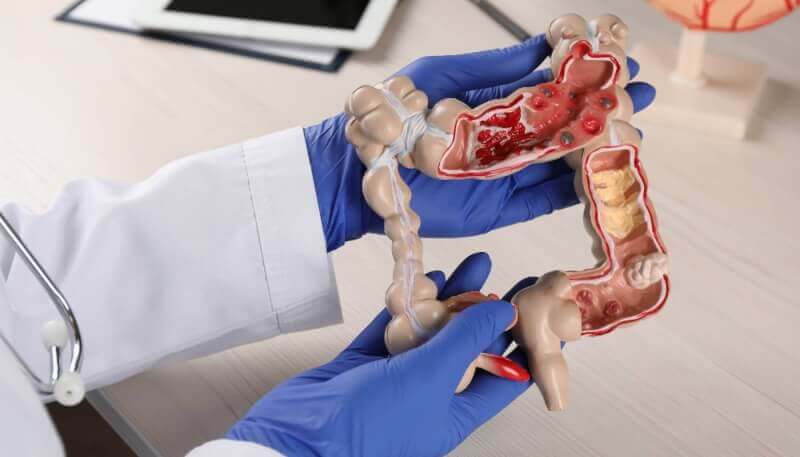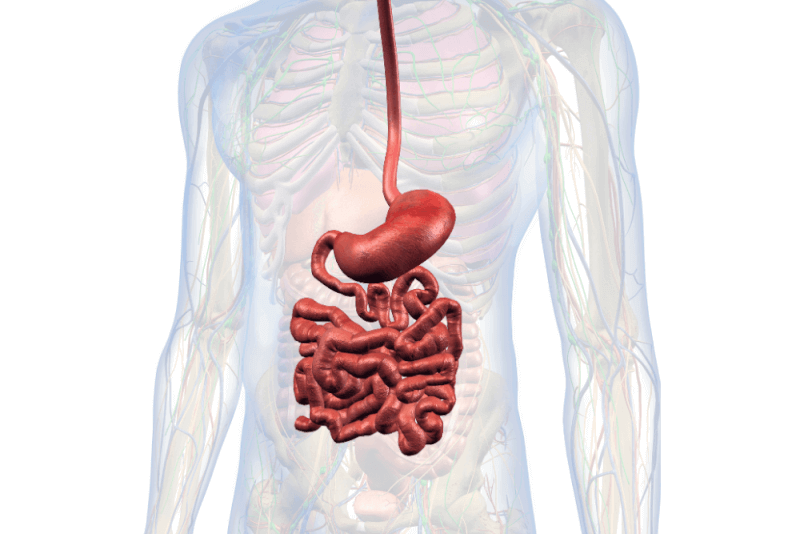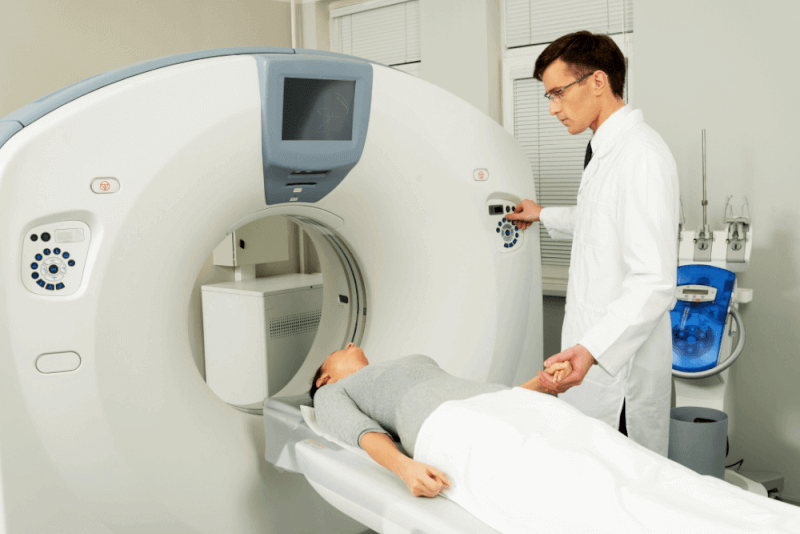30-Second Summary
- Colon cancer is a type of cancer that forms in the colon and occurs due to the uncontrolled growth of cells.
- The most common symptoms of colon cancer include blood in the stool, weight loss, constipation, and diarrhea.
- Early diagnosis is the most crucial factor in increasing the success rate of colon cancer treatment.
- The treatment for colon cancer varies depending on the stage of the cancer.
What is Colon Cancer?
The colon is a long tube-shaped structure that helps move digested food to the rectum and then out of the body. Colon cancer occurs in specific polyps or growths in the lining of the colon. Due to this characteristic, polyps can be removed before they become cancerous through screening tests.
The colon wall is composed of a mucosal layer and muscle layer. Colon cancer starts in the cells that form the innermost layer of the colon, which produce mucus and other bodily secretions. If these cells undergo mutations over time and start growing faster than normal, colon cancer occurs.
Polyps in the colon can become cancerous over time, typically taking around 10 years. If these polyps are not diagnosed or treated within this period, cancer cells may spread beyond the colon's outer layer.
Who is Affected by Colon Cancer?
Colon cancer is one of the most common types of cancer. It is more likely to occur in men than women. Additionally, it is more frequently observed in individuals of African descent. Colon cancer primarily affects people over the age of 50. However, statistics from the last 15 years show an increasing incidence in the 20 to 49 age range.
Colon Cancer Diagnosis Criteria
Tests used to diagnose colon cancer include:
- Complete blood count
- Comprehensive metabolic panel
- Carcinoembryonic antigen test
- X-rays
- CT scans
- Magnetic resonance imaging
- Positron emission tomography
- Ultrasound
- Biopsy
Differences Between Screening Tests and Diagnostic Tests for Colon Cancer
Cancer screening tests are applied to individuals showing symptoms of colon cancer. Additionally, if an abnormality is detected in previous screenings, colon cancer tests are also performed. Apart from that, screening tests are conducted as precautionary measures in individuals with no symptoms or health issues to detect early signs of colon cancer.
Common Colon Cancer Screening Tests
Colonoscopy is the most commonly used method in colon cancer screening tests. Other tests include:
- The fecal immunochemical test (FIT) detects hidden blood in the stool, allowing for the detection of invisible blood cells.
- The guaiac-based fecal occult blood test (gFOBT) also detects signs of invisible blood in the stool, similar to FIT.
- DNA stool testing searches for genetic mutations and blood products in the stool.
- Flexible sigmoidoscopy allows visualization of the lower colon and rectum.
- Virtual colonoscopy is an X-ray procedure that visualizes polyps, ulcers, and tumors in the colon and rectum.
Causes of Colon Cancer
As with other types of cancer, colon cancer is caused by uncontrolled cell growth. In a normal cell cycle, growth and destruction follow each other. However, in cancer cells, there is no destruction. Instead, the cells continue to divide and grow.
Some research suggests that polyps found in the colon may lead to colon cancer. However, this is not considered a confirmed fact. Nevertheless, certain risk factors are known to increase the risk of colon cancer, including lifestyle factors and certain medical conditions. While having these risk factors increases the risk of developing colon cancer, it does not guarantee it.
Symptoms of Colon Cancer
Symptoms of colon cancer may not appear in every patient. In some cases, it is unclear whether symptoms are present. This is because the symptoms of colon cancer can resemble less serious health problems. However, common symptoms of colon cancer include:
Blood in the Stool
If dark or bright red blood is seen in the stool, it is important to consult a specialist. However, seeing blood in the stool is not always a sign of colon cancer. It can also result from hemorrhoids or consuming red foods.
Persistent Changes in Bowel Habits
If a person experiences persistent diarrhea or constipation, or feels that the bowels are not completely emptied after a bowel movement, it is essential to consult a specialist.
Abdominal Pain
If abdominal pain is unexplained, severe, or does not go away, it is crucial to seek medical attention. Although many causes can lead to abdominal pain, it is essential to consult a doctor, especially in cases of unusual and recurring pain.
Abdominal Bloating
While there are many causes of abdominal bloating, it is necessary to consult a healthcare provider if the following conditions accompany it:
- Bloating lasting more than a week
- Worsening of bloating
- Blood in the stool
- Vomiting and the presence of blood in vomit
Unexplained Weight Loss
If there is unexplained weight loss without any effort to lose weight, it is essential to consult a doctor.
Vomiting
Vomiting may indicate colon cancer in the following situations:
- Vomiting without a known cause
- Excessive vomiting within 24 hours
- Periodic vomiting
Fatigue and Shortness of Breath
Fatigue and shortness of breath are typically symptoms of anemia, and colon cancer is one of the conditions that can cause anemia.
Colon Cancer Treatment Methods
There are various treatment methods for colon cancer. Some of these methods are considered standard treatments for colon cancer, while others are still in clinical trials. If the results of clinical trials prove more effective than standard procedures, these trials may also become part of standard colon cancer treatments. The following are some of the methods used in colon cancer treatment:
- Surgery
- Radiofrequency ablation
- Cryosurgery
- Chemotherapy
- Radiation therapy
- Targeted therapy and immunotherapy
The above methods are considered standard treatments for colon cancer. Additionally, patients may choose to participate in clinical trials if they wish.
Colon Cancer Surgery
Surgical removal of the tumor is the most common treatment option for all stages. The following methods are used in this procedure:
Local Excision
This method is used when colon cancer is diagnosed at a very early stage. In this procedure, cancerous tissue can be removed without cutting the abdominal wall. Instead of making an incision in the abdomen, a tool is inserted through the rectum to cut out the cancerous tissue. If the cancer is in a polyp or raised tissue, the procedure is called a polypectomy.
Anastomosis
This surgical procedure is performed when the cancerous tissue has grown. During this procedure, a small amount of healthy tissue is also removed along with the cancerous tissue. After removing the necessary tissues, the surgeon connects the separated parts of the colon. This procedure is called anastomosis. Lymph nodes near the affected area are often removed during anastomosis surgeries, followed by a biopsy of the lymph nodes.
Colostomy
Colostomy is performed when the ends of the colon cannot be reconnected after removing the cancerous tissue. In this case, an opening (stoma) is created in the abdomen to allow waste to pass out of the body. This procedure is called colostomy. In some cases, colostomy is temporary, and after the lower colon heals, the ends of the colon are reconnected, eliminating the need for an external waste bag. However, in some patients, colostomy is permanent.
Radiofrequency Ablation
Radiofrequency ablation is a method used to kill cancer cells. It involves using a probe with special electrodes to destroy cancerous cells. This procedure can be performed through the skin. Local anesthesia is applied to patients when this method is chosen. The most common application of radiofrequency ablation is to directly contact the cancerous tissue with the electrodes. In this case, an incision is made in the abdominal area, and the probe is placed on the cancerous tissue.
Cryosurgery
Cryosurgery involves freezing abnormal or cancerous tissue. By freezing the cells, the progression of the disease is prevented, and cancerous cells are killed.
Colon Cancer Chemotherapy
Chemotherapy is a standard treatment for colon cancer used to stop the growth of cancer cells and kill existing cancerous cells. It can be administered orally, intramuscularly, or intravenously. Special chemotherapy drugs given to patients target the cancerous tissue and provide the necessary effect. This is known as systemic chemotherapy.
In some chemotherapy treatments, the drugs are directly delivered to the cerebrospinal fluid, organ, or abdominal cavity. This method is called regional chemotherapy. The application of chemotherapy depends on the stage of cancer.
Radiation Therapy
Radiation therapy is another method used to kill or stop the growth of cancer cells. It involves using high-energy X-rays or other types of radiation. Radiation therapy is divided into two main types.
In external radiation therapy, a machine is used to direct radiation to the cancerous area of the body. In internal radiation therapy, needles, wires, or catheters are placed directly into or near the cancerous tissue. These devices deliver radioactive material to the affected tissues.
Radiation therapy can be applied differently depending on the stage of cancer. External radiation therapy is often used as palliative care to relieve symptoms and improve quality of life.
Targeted Therapy
Targeted therapy involves using drugs or other treatments to identify and attack specific cancer cells. The main advantage of targeted therapy over chemotherapy and radiation therapy is that it causes less damage to normal cells. Targeted therapies used in colon cancer include:
Monoclonal Antibodies
Monoclonal antibodies are proteins found in the immune system used to treat various diseases, including cancer. Monoclonal antibodies bind to specific targets on cancer cells or other cells that may become cancerous. They then help kill cancerous cells. Additionally, monoclonal antibodies can block the division of cancerous cells, preventing the spread of cancer. Monoclonal antibodies administered through infusion can work independently or deliver drugs, toxins, or radioactive substances directly to the cancer cells.
There are different types of monoclonal antibody therapy, including:
Vascular Endothelial Growth Factor (VEGF) Inhibitor Therapy
Cancer cells produce a special substance called VEGF, which promotes the formation of new blood vessels and supports cancer growth. VEGF inhibitors block the VEGF produced by cancer cells, preventing new blood vessels from forming. Without new blood vessels, cancer cells cannot receive nutrients and eventually die.
Epidermal Growth Factor Receptor (EGFR) Inhibitor Therapy
EGFR is a protein found on the surface of some cells, including cancer cells. EGFR attaches to the surface of cells, promoting their growth and division. Inhibitors used in treatment block the receptor, preventing EGFR from attaching to the cell. This stops the growth and division of cells.
Angiogenesis Inhibitors
This method prevents the growth of new blood vessels that support tumor growth. It is divided into two main types. The first is Ziv-aflibercept, which acts as a vascular endothelial growth factor trap, blocking enzymes necessary for blood vessel growth.
Regorafenib is another method used to treat colon cancer that has metastasized to other parts of the body. It blocks several enzymes, including vascular endothelial growth factor. This method can prevent cancer cell growth and kill cancer cells. It also prevents the formation of new blood vessels.
Protein Kinase Inhibitor Therapy
Protein kinase inhibitor therapy blocks the protein necessary for cancer cell division. The options within protein kinase inhibitor therapy include mutant BRAF and encorafenib BRAF inhibitors.
Immunotherapy
Immunotherapy is a method that uses the patient’s immune system to fight cancer. It can use immune cells naturally produced in the body or lab-made immune substances. The goal of this therapy is to strengthen, direct, and restore the body's natural defenses, making immunotherapy a form of biological treatment.
Immune Checkpoint Inhibitor Therapy
Cancer cells can evade detection by the immune system by producing proteins called checkpoints that reduce the response of T cells. Immune checkpoint inhibitors block these checkpoints, allowing T cells to kill cancer cells more effectively. Immune checkpoint inhibitor therapy is divided into two main types:
CTLA-4 Inhibitor Therapy
CTLA-4 is a protein on the surface of T cells that helps regulate the immune response. When CTLA-4 binds to another protein called B7 on the T cell, the T cell stops killing cancer cells. CTLA-4 inhibitors bind to the CTLA-4 protein, allowing T cells to continue killing cancer cells.
PD-1 and PD-L1 Inhibitor Therapy
PD-1 is another protein found on T cells that influences the immune response. PD-L1 is a protein found on the surface of some cancer cells. When PD-1 binds to PD-L1, the T cell stops killing cancer cells. PD-1 and PD-L1 inhibitors prevent these proteins from binding, allowing T cells to continue killing cancer cells.
Stages of Colon Cancer
Colon cancer staging is done using the TNM cancer staging system developed by the American Joint Committee on Cancer. There are five stages of colon cancer, each with its own sub-stages.
Stage 0
The first stage of colon cancer is also known as carcinoma in situ. At this stage, abnormal or precancerous cells are found in the innermost layer of the colon, the mucosa.
Stage 0 Treatment
Surgery is recommended for stage 0 colon cancer. The surgical options for patients at this stage include:
- Local excision
- Simple polypectomy
Stage 1
In stage 1 colon cancer, the cancer grows into the colon wall. However, cancer cells are not seen in the muscle layer or nearby lymph nodes. Additionally, growth toward the muscularis propria may be observed.
Stage 1 Treatment
Surgery is also recommended for patients at this stage, with resection and anastomosis surgeries being potential options.
Stage 2
Stage 2 colon cancer is divided into three sub-stages:
Stage 2A
The first sub-stage is known as 2A. At this stage, cancer cells grow toward the outermost layers of the colon or rectum but do not cross this boundary. There is no spread to nearby lymph nodes or distant areas.
Stage 2B
In stage 2B, cancer cells grow through the wall of the colon or rectum. However, there is no spread to nearby lymph nodes or distant areas.
Stage 2C
In stage 2C, cancer cells grow beyond the wall of the colon or rectum and spread to nearby tissues and organs. However, there is no spread to nearby lymph nodes or distant areas.
Stage 2 Treatment
In stage 2 colon cancer, as in stage 1, resection and anastomosis surgeries are recommended.
Stage 3
Stage 3 colon cancer is also divided into three sub-stages. The definitions of these stages are further subdivided into three categories:
Stage 3A
The first sub-stage is stage 3A. At this stage, cancer grows from the mucosa to the submucosa. Additionally, growth may be observed toward the muscularis propria. Furthermore, cancer cells are found in 1-3 nearby lymph nodes and fatty areas near the lymph nodes. No cancer cells are found in distant areas.
Another scenario defined as stage 3A is the growth of cancer cells from the mucosa to the submucosa. Additionally, cancer cells are found in 4-6 nearby lymph nodes, but no cancer cells are seen in distant areas. Another scenario that may be observed in stage 3A colon cancer is the spread of cancer cells from the mucosa of the colon wall to the submucosa or the muscularis propria of the colon wall. Cancer affects 1-3 nearby lymph nodes.
Stage 3B
In stage 3B, three different situations can be observed in patients. In the first, cancer cells spread from the muscle layer of the colon to the outermost layer of the colon wall or to the membrane surrounding the abdominal organs through the serosa. Additionally, cancer cells are found in 1-3 lymph nodes near the affected area.
Another scenario that may be observed in stage 3B is cancer spreading to the muscle layer of the colon wall or the outermost layer of the colon. Cancer also affects 4-6 nearby lymph nodes. Finally, in this stage, cancer cells continue to spread from the mucosa to the submucosa or the muscle layer of the colon wall. Cancer cells are found in at least 7 lymph nodes near the affected area.
Stage 3C
In stage 3C colon cancer, three different scenarios can be observed. In the first scenario, cancerous tissue is found in the outer wall of the colon and the membrane covering the abdominal organs. Additionally, cancer cells are found in 4-6 lymph nodes near the affected area.
In the second scenario, cancer cells are again found in the outermost layer of the colon and the visceral peritoneum. Additionally, cancer cells are found in at least 7 lymph nodes.
In the final scenario of this stage, cancer is found in the outermost layer of the colon wall and nearby organs. Additionally, cancerous cells are found in one or more lymph nodes near the affected area. Cancerous cells are also found in tissues near the lymph nodes.
Stage 3 Treatment
The recommended treatment options for stage 3 colon cancer include:
- Resection and anastomosis surgeries followed by chemotherapy
- Clinical trials of new chemotherapy methods after surgery
Stage 4
In stage 4 colon cancer, metastasis occurs in distant areas. Cancer cells spread to the lungs, liver, abdominal wall, or ovaries via blood and lymph nodes. Stage 4 colon cancer is also divided into three sub-stages.
In stage 4A colon cancer, cancer cells spread to distant areas such as the liver, lungs, ovaries, or distant lymph nodes that are not near the colon.
In stage 4B, cancer spreads to multiple tissues that are not near the colon.
In the final stage, 4C, cancer cells spread to the abdominal wall, the peritoneum covering the abdomen, and other areas.
Stage 4 Treatment
If colon cancer is in stage 4 or is recurrent, the recommended treatment options for patients include:
- Local excision for recurrent tumors
- Resection with or without anastomosis
- Surgery on metastasized organs
- Preoperative chemotherapy to shrink the tumor
- Postoperative chemotherapy
- Radiofrequency ablation or cryosurgery for inoperable patients
- Hepatic artery chemoembolization
- Radiation and chemotherapy may also be applied as palliative care to improve the quality of life for some patients.
- Targeted therapy
- Immunotherapy
- Clinical trials of chemotherapy or targeted therapy
Signs of Death in Colon Cancer
The terminal stage of colon cancer is accepted when treatments no longer respond. Knowing what happens during this period is important for understanding what to expect and improving the quality of life for patients. The appearance of signs of death does not indicate the exact time of death. Additionally, the symptoms seen are progressive. Symptoms in stage 4 colon cancer are not only related to the colon. Since it metastasizes, symptoms related to other organs may also be seen.
Pain
Pain is prominent in the final stage of colon cancer due to metastasis. Pain is present not only in the colon but also in other affected organs. The pain felt by patients in their final stages is very intense. Therefore, opioid narcotics or strong pain relievers are prescribed during this period. For patients with difficulty swallowing, sublingual or injectable medications are recommended.
In the final days of life, patients spend most of their time sleeping, making it difficult to tell if they are in pain. However, the following signs indicate that the patient is in pain:
- Rapid breathing
- Facial grimacing
- Furrowing of the brows
- Constant movement of the arms and legs
Loss of Consciousness
Loss of consciousness is another typical sign seen in patients in the final stages of life. In the final days and hours, patients almost enter a coma. This is not a side effect of medications, as many people believe. However, the exact cause of loss of consciousness in the final stages of colon cancer is unknown.
Changes in Breathing
Another change observed in the final stages of life is a change in breathing rhythm. For example, there may be long pauses between breaths or a rattling sound. Additionally, if a sound similar to a gurgle, known as the death rattle, is heard, it indicates that the patient has only a few hours left. At this stage, it is recommended to elevate the patient’s head and avoid giving more fluids to ensure comfort.
Agitation
Another sign seen in the final stages of life is agitation and hallucinations. Confusion increases as patients approach the end. At this stage, patients may not recognize their surroundings and may see people who are not there, angels, or insects. Additionally, irritability and restlessness may occur. Sedatives may be used during this stage. It is also important for caregivers to remain calm and not further distress the patient, treating them gently.
Alertness
Patients in the final stages of life may suddenly become alert after being in a constant state of sleep. During this stage, they may be fully awake and even request food. This can confuse families, leading them to believe that their loved one is recovering. However, this is temporary and is considered a sign of impending death in the final stage of colon cancer. The period of alertness can last a few hours or a few days, depending on the patient. The reason for this alertness and why it does not occur in some patients is unknown.
Other Symptoms
Other symptoms observed in patients nearing death due to colon cancer include:
- Exhaustion
- Weight loss
- Bloody stool
- Constipation
- Jaundice if the liver is affected
What Helps with Colon Cancer?
Methods that support colon cancer treatment also help reduce the risk of colon cancer. These methods include:
- Consuming various vegetables, fruits, and whole grains provides fiber, vitamins, and minerals that support cancer treatment. To ensure a variety of vitamins and minerals, it is important to diversify the fruits and vegetables consumed.
- Although alcohol consumption is not recommended, those who drink should limit their intake. Women should not consume more than one drink per day, and men should not consume more than two.
- Avoiding the use of tobacco products.
- Exercising most days of the week.
- Maintaining a healthy weight.
Colon Cancer Risk Factors
Colon cancer is typically seen in people over 45 years old, but certain factors increase the risk. These factors include:
- Colon cancer is more common in people over 50 years old. In recent years, the number of cases in this age group has been increasing.
- Colon cancer is more prevalent in the Black population.
- Smoking
- Excessive alcohol consumption
- Obesity
- Consuming large amounts of red meat
- Consuming large amounts of processed meat products
- Lack of exercise
- Inflammatory bowel diseases
- Hereditary conditions
- A family history of colon cancer or other types of cancer
- A family history of polyps
- Having a large number of polyps
- Personal history of colorectal cancer or polyps
- Hereditary syndromes that increase the risk of colon cancer
- A low-fiber and high-fat diet
- Previous radiation therapy for cancer
Surgery Summary
Duration of Surgery: 2-4 hours
Anesthesia Method: General
Hospital Stay: 4-7 days
Return to Work: 2-8 weeks










